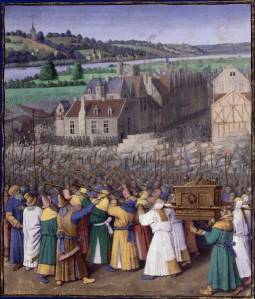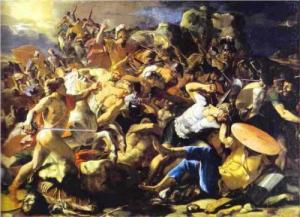The Plan
The ethnic cleansing of Canaan begins not with Joshua, but with a promise made to Abraham: God would give this land to Abraham as a part of the covenant He made (Gn 17:8; Ex 6:4). This is a very important piece of context, because it reveals two things. The first is that the genocide of Canaan was planned long before the victims of Joshua were even born. The second is that Abraham, as well as his descendants through Moses, were foreigners in the land.
Genesis 7:8 – “The whole land of Canaan, where you now reside as a foreigner, I will give as an everlasting possession to you and your descendants after you; and I will be their God.”
Exodus 6:4 – “I also established my covenant with them to give them the land of Canaan, where they resided as foreigners.”
Regardless of the status of the State of Israel today, the history of Israel, Palestine and so forth – this is not a political point – the ancient Hebrews were not natives to this area. It is land that they resided in, but were foreign to. These were an external invading force. People lived here. In fact, the exact same ethnic groups had been living continuously in Canaan between the time of the Exodus from Egypt, when Moses arrived, and when they returned some few decades later (Ex 33:2; Ex; 34:12-13). Many of the ethnic groups had continuously lived in the area from the time it was promised to Abraham (Gn 14:5-7).
To reiterate the point – this was a planned genocide. It was not incidental or a tactic of last resort. God commanded Joshua and the Israelites to enter into Canaan, drive out all of its inhabitants and destroy their religious monuments (Nm 33:50-56). God specifically commanded that they must be destroyed totally and commanded that Israel make no treaty and show no mercy (Dt 7:2). This is presented by God to Joshua as two specific plans of action, one for the cities at a distance to the promised land, one for the cities that are a part of the promised land. For the cities at a distance, Joshua must march to a city, offer peace and then enslave the population if they accept. If they refuse to be enslaved, Joshua is to kill every man and take the women, children and livestock – as well as all other property – as plunder (Dt 20:10-14). For the cities within the promised land, full genocide:
Deuteronomy 20:17 – “However, in the cities of the nations the Lord your God is giving you as an inheritance, do not leave alive anything that breathes. Completely destroy them—the Hittites, Amorites, Canaanites, Perizzites, Hivites and Jebusites—as the Lord your God has commanded you.”
The Victims
Between 300,000 and 2,000,000 killed.
Six people impaled on poles. (Jo 8:26; Jo 10:26)
One man stoned and set on fire (Jo 7: 25)
It is impossible to come up with an exact death toll for the genocide of Canaan. For one, we do not know if these were truly historical events. This is another debate completely. The Bible also does not give us any indication of a full death toll. The city of Ai had a population of 12,000 who were exterminated completely (Jo 8:25). Jericho was said to be larger than Ai. Gibeon, which was subsequently enslaved, was larger than Ai as well (Jo 10:2). The major ethnic groups targeted for extermination – the Hittites, Girgashites, Amorites, Canaanites, Perizzites, Hivites, and Jebusites – were said to be larger and stronger than Israel (Dt 7:1). The population of Israel upon leaving Egypt was said to be approximately 600,000 men, not including women and children (Ex 12:37; Nm 1:46; Nm 26:5). Based on this estimates of the Hebrew population range between two and six million individuals.
Joshua exterminated all of these groups, save for the Hivites who lived in Gibeon (who were enslaved) (Jo 11:19). Thirty-one different kings were killed (Jo 12:1). If we estimate small city-states, such as Ai, this gives us a number of 300,000. If we go by what Deuteronomy says, the nations being larger than Israel, we can easily exceed two million ethnically cleansed.
The Response
As has been demonstrated, this genocide was planned long before it was put into action. Again, this is important because one must consider that this was not a defensive war. Israel was not defending itself from Canaan; Canaan was defending itself from Israel. When Moses and the Israelites return from wandering in the desert, they request passage to Canaan and are refused by the King of Edom (Nm 20:18-20) in Kadesh. The King of Edom tells Moses that if they attempt to pass through, they will be met with force. Moses and the Israelites invade the borders of Edom, despite the warning, and are eventually forced to go around. Edom defended its sovereign borders and, most likely, did not want to appear to be assisting a hostile invading force, despite its amiable ties with Israel.
This is exactly what played out with the King of Arad (Nm 21:1-3) and the King of the Amorites, Sihon (Nm 20:21-26). However, Israel won. Israel continued through Bashan (Nm 21:33) and then into Gilead (Nm 32:39-42). These are all events that took place before Joshua’s conquest of Canaan, simply to reach the promised land. These nations refused to let a foreign army pass through their borders; the foreign army ethnically cleansed them and settled their land.
Jericho and Ai hid within their walls (Jo 6; Jo 8), were besieged and exterminated. The Gibeonites saw what happened to Ai, were afraid and used deception to seal a peace treaty with Israel. They were spared, but forced to be perpetual slaves (Jo 9:23-24). Adoni-Zedek, the King of Jerusalem – whose name means “God is Righteous” and, incidentally, may have shared an early Hebrew religious tradition – was afraid of Joshua and, along with four other kings, attempted to attack Gibeon. They were defeated and hung on trees as a display (Jo 10:23-26). Many of the nations attempted to flee, but were pursued and exterminated completely (Jo 11:10-11).
Point: Israel was not defending itself. In fact, Joshua went out of his way to hunt down escapees and used techniques, such as impaling enemy kings on poles, more fit for Vlad Tepes than the tool of a righteous God. Joshua repeatedly left no survivors (Makkedah, Libnah, Jo10:30; Lachish, Jo 10:33), totally destroyed everyone in the city (Eglon, Jo 10:35), made sure to kill everyone in the surrounding villages (Debir, 10:39), did not spare anything that breathed (Jo 11:11), carried off livestock and put every person to the sword, “not sparing anyone that breathed” (Jo 11:12-14), and “exterminating them without mercy, as the Lord had commanded Moses.” (Jo 11:20)
The Aftermath
Eventually Joshua grew old. One might think that after an entire lifetime of invading and ethnically cleansing your neighbors, you could get a little peace. Not so:
Joshua 13:1 – “When Joshua had grown old, the Lord said to him, “You are now very old, and there are still very large areas of land to be taken over.”
Nice work, Joshua, but the genocide train must continue. As the Israelites grew stronger they would continue to enslave the remaining Canaanites where possible (Jo 17:13). And, upon Joshua’s death, the mantle would immediately be passed. This is the very first chapter of the next book, Judges, starts:
Judges 1:1 – After the death of Joshua, the Israelites asked the Lord, “Who of us is to go up first to fight against the Canaanites?”

